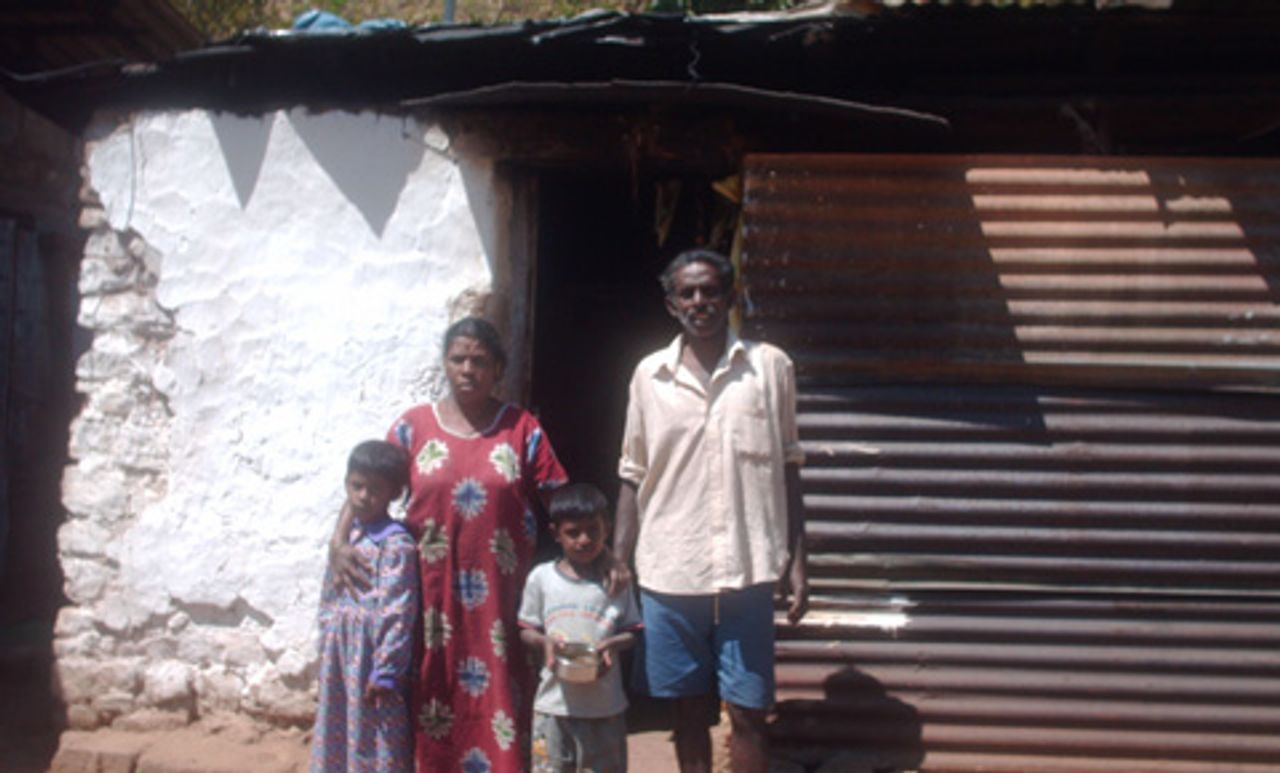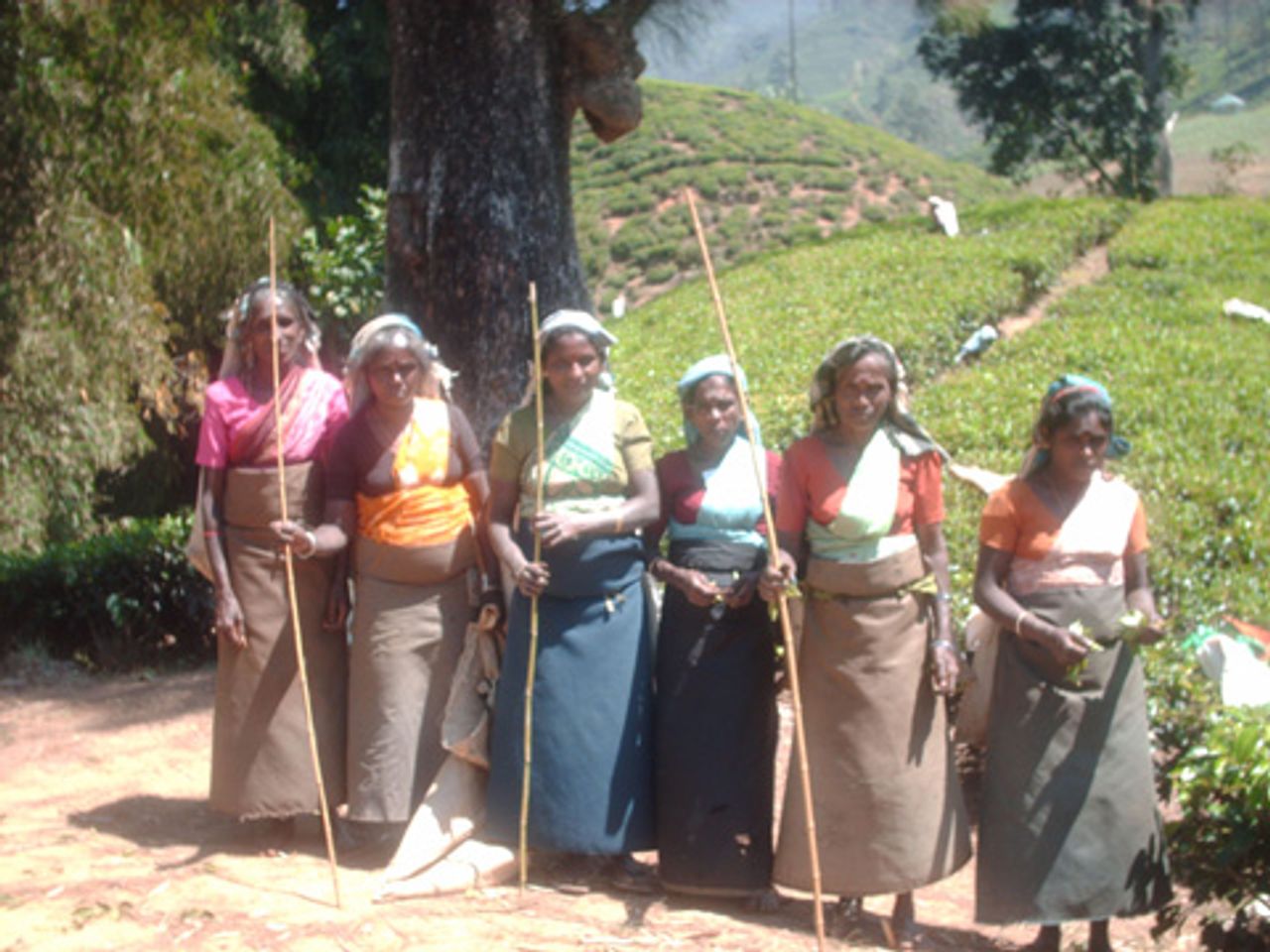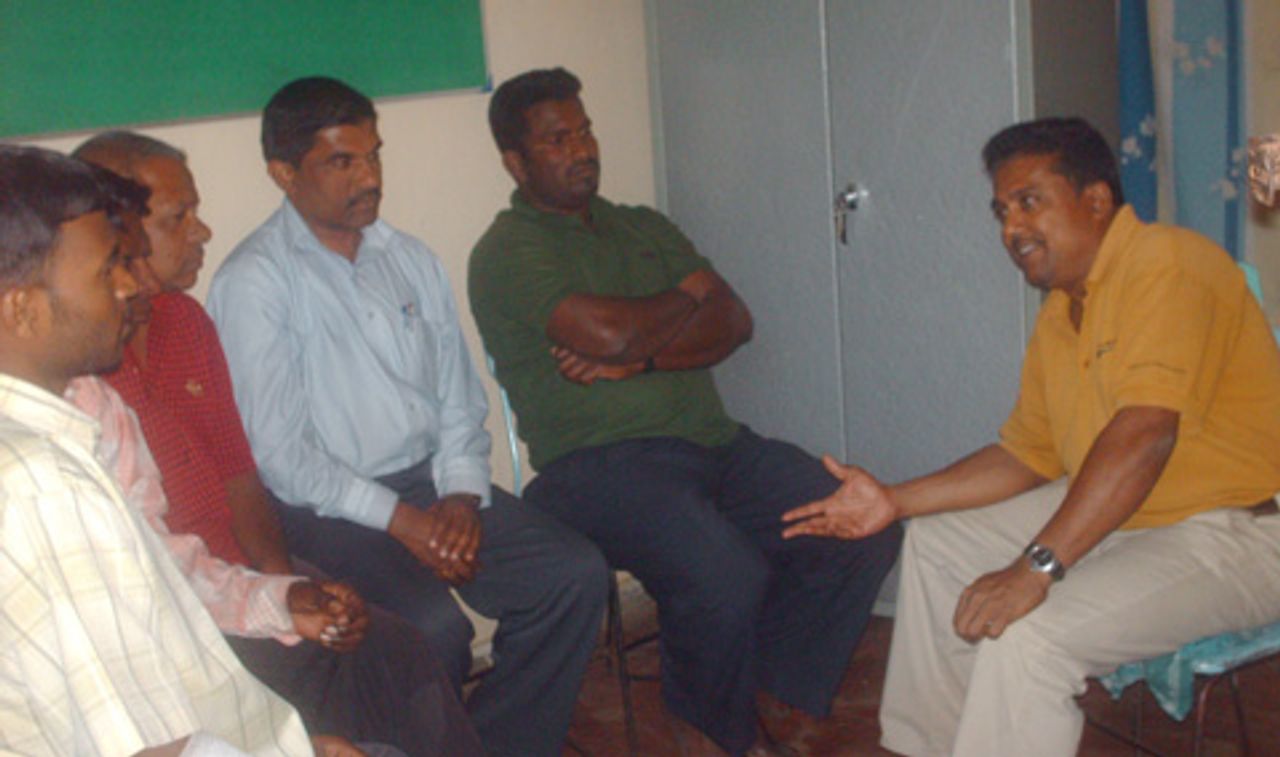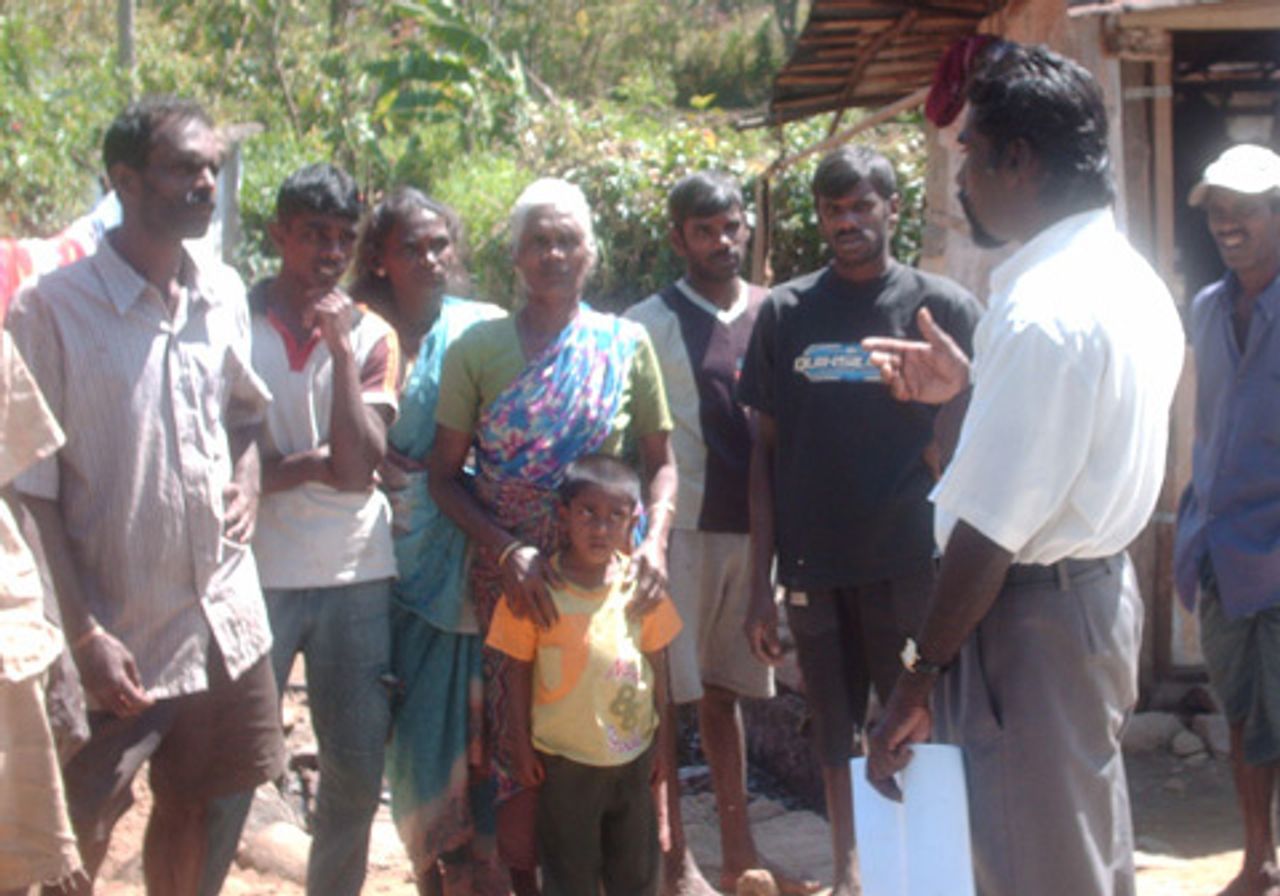As part of its campaign for the Sri Lankan Provincial Council elections on February 14, the Socialist Equality Party (SEP) has been campaigning among plantation workers in the Nuwara Eliya district. The SEP is standing two lists of 19 candidates—one in Nuwara Eliya in Central Province and the other in Puttalam in the North-Western Province.
Most of Sri Lanka's plantation workers—numbering around half a million—live in the Nuwara Eliya district, situated in the island's central hills region. Most are Tamil speaking, the descendents of indentured labourers brought to Sri Lanka in British colonial times to work in the tea estates. They are still among the most oppressed layers of the working class.
The SEP's campaign has centred in the town of Hatton, around 110 km from Colombo, which is surrounded by tea estates. One team went to the town of Upcot or Samimalai, about 20 kilometres from Hatton. The journey takes an hour and a half along a rough, narrow road built during British colonial rule. Buses run at one-hour intervals and stop after 4.30 p.m.—confining estate workers to the small town.
The tea is plucked by women who work long hours from the early morning. Each woman carries a large basket for the plucked tips, as well as a wooden rod to level the tea bushes after harvesting, and covers her head with a small piece of cloth to keep off the sun. Most men are involved in maintaining the estates—building stone walls to prevent soil erosion and clearing weeds. Some work at the tea factories.
On the way to Upcot, the bus was stopped by police in the town of Norwood. The national identity cards of all passengers were checked and names recorded. As the government has intensified its war against the Liberation Tigers of Tamil Eelam (LTTE), the security forces have imposed a vast network of road blocks and check points throughout the island. Tamils in particular are the target of harassment and persecution. Security measures were tougher on the day because President Mahinda Rajapakse was due to speak in the area.
 A family outside their line room
A family outside their line roomThe SEP team was able to speak to workers as they returned home for lunch at noon. Home is a line room or "line" for short. It is barrack-style accommodation—a long building divided into individual rooms. Each family has one room of about 18 square metres, lacking in basic facilities. Most are old and rundown, built over 75 years ago by the British plantation owners.
The women have just one and a half hours to make the midday meal and feed their children before going back to the fields. They talked to the SEP team as they prepared the food. With their brusque, no-nonsense approach, some declared: "We are fed up with political parties. In our area none of the existing parties have done anything for us. Please do not waste your time." But they began to listen and open up, as we explained the SEP's opposition to the war and its fundamental differences with all the establishment parties.
Many workers were very angry at the role of their trade unions—the Ceylon Workers Congress (CWC) and Upcountry Peoples Front (UPF). These organisations, which also function as political parties and benevolent societies, are deeply conservative and dominated by a small well-off elite. Their leaders have exploited their base among plantation workers to obtain seats in parliament and shamelessly wheel and deal with the major parties. CWC leader Arumugam Thondaman and UPF leader Chandrasekeran are both ministers in the Rajapakse government.
A woman worker bitterly explained: "We have fought to get our wages increased. But Thondaman betrayed us by signing collective agreements with the management twice. The CWC trapped us by agreeing not to take industrial action for two years. Thondaman always takes part in the government and always takes the side of employers. Chandrasekeran is no different.
 A group of tea pluckers
A group of tea pluckers"I do not see any use in getting wages increased as prices are skyrocketing. Our daily basic pay is 200 rupees [about $US1.75]. An allowance of 90 rupees is also paid—70 rupees as a production incentive and the other amount depends on the price of tea. Recently the tea industry has gone down and we are not given the full payment of 290 rupees. At most, we earn under 9,000 rupees a month. We have to cover all our expenses, including the children's education and health care, from this pittance. So most of us have only one meal for the whole day—lunch."
Another worker pointed to the absurd lengths to which the CWC and UPF went to get votes. "Chandrasekeran says he has a project for a 200-metre concrete road for our estate, while Thondaman declares his road's length is 250 metres. But they don't care about one of our main needs—proper sanitation. Since the time of British rule we have never had toilets.
"President Mahinda Rajapakse says that workers who earlier walked by jumping from one stone step to next now travel to their lines by four-wheel or three-wheel vehicles. But we still have to go through tea bushes and stone steps to Maskeli Oya [a stream] to relieve our bowels. The president claimed that 80 percent of roads in the plantation area have been renovated. But the truth is that not even 20 percent have been completed."
Asked about Rajapakse's promise to build new houses, she said: "We have not received any yet but people in some adjoining estates have some. Those houses are not so different from the present lines—they are just two-storey line houses. A family still has only a single room. People will have to pay 356 rupees per month for 60 years for these houses. Their children will inherit the parents' debts."
A young man, Mohan, speaking of the problems facing youth, said: "Most of us go to Colombo to look for work, leaving school at around 12 to 13 years of age. We might get jobs as hotel helpers or domestic servants. We come back here when we are about 20. The estate management does not enlist us on their payrolls, as we are not treated as residents here.
"Working in Colombo is difficult. We face so much discrimination and police harassment because we are Tamil. They treat us as enemies and LTTE supporters. Some youth are operating three-wheelers [taxis] in Upcot town. Police fabricate charges for this or that offence and have tried to fine us. To get off we have to bribe them."
 SEP candidate Panini Wijesiriwardane speaking to teachers
SEP candidate Panini Wijesiriwardane speaking to teachersThe SEP team spoke to teachers at the Gawarawila Tamil Vidyalaya (school) in the Gawarawila estate. They were particularly interested in the SEP's analysis of the origins of the civil war as a continuation of the communal policy of successive governments, since independence in 1948, to divide the workers along ethnic lines.
Again the discussion returned to the role of the present organisations. One teacher agreed with the need to organise the working class independently but added: "When we try to engage in politics different from the CWC, UPF and the like, they suppress us. The trade union bureaucracy acts like a police force."
Other discussions took place with teachers at Bogawantalawa, Dickoya and Dunkeld. Schools in the plantation area suffer from the lack of teachers, buildings and basic resources. Even the limited teaching materials do not come from the government but are donated by non-government organisations. Recently 3,000 teachers with Advanced Level (university entrance examination) qualifications were recruited, but there were no plans to properly train them.
A report by the Sahaya Foundation explained: "Statistics indicate that of the school age children in the plantation sector, only 58 percent attend up to completion of primary schooling and only 7 percent of students who pass Ordinary Level (10th grade) proceed to Advanced Level studies. Less than 1 percent of the students who complete their Advanced Level exam actually make it to university (less than 10 a year)."
Following a series of campaigns, the SEP held a successful meeting at the Upcot Cultural Hall, attended by male and female plantation workers, young people and teachers. Several speakers including M. Thevarajah, who leads the SEP candidate list for the Nuwara Eliya district, addressed the gathering. Workers donated 2,000 rupees to assist the SEP campaign.
 SEP candidate Kalan Pathmanathan speaking to a group of workers
SEP candidate Kalan Pathmanathan speaking to a group of workersAfter the meeting, one worker told the WSWS: "There were two other meetings held today. One is that of the [opposition] United National Party at Kotagala and the other is that of the government at Hanguranketha. For those meetings, people were transported by bus and each of them was given 500 rupees, a lunch packet and liquor. For this meeting we were not bribed, but instead we gave money. The prime reason for me to come was that this was a meeting opposing the war that has brought us immense burdens."
A young masonry worker said: "Although the president has said that our living conditions are improved and more money would be allocated for that, our experience is that the war consumes more than one-fifth of government expenditure. It could be even more than that in the future with the deepening of the economic crisis. Several other young people had also hoped to participate in this meeting. They did not come, thinking this would be a meeting just like those of other parties. I will explain to them that this party has a different program and different policies."
